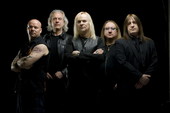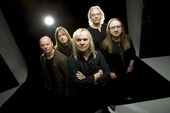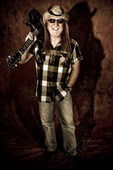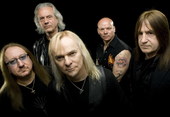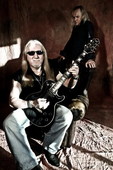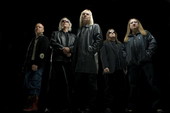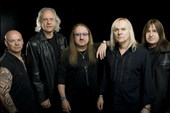Uriah Heep
28.11.2009
Архив интервью | Русская версияLegendary British hard rockers Uriah Heep celebrate their 40th anniversary this year – and this alone is a valid reason for talking to the person who founded this band, its irreplaceable guitarist Mick Box. Moreover, the five-piece has just released a new anniversary album symbolically titled “Celebration”, and this is yet another good reason to call the UK and discuss the past, the present, the future and life in general. But the first thing to do is to congratulate Mick on such an impressive anniversary, which is what I started the interview with…
Oh, thank you. It’s a very special thing for us.
How did you celebrate this date? Did you sit down and maybe recall your ex-bandmates somehow?
Yes, obviously. We do miss them, especially David and Gary (David Byron and Gary Thain, who were crucial for Heep’s sound in the early 1970s, passed away many years ago – ed.). But this is where we are today and we’re celebrating that fact with the guys I’ve been with for more than 20 years.
The history of Uriah Heep has been very dramatic. And you are the only one who’s been there since the very beginning. What made you believe in this band and carry on through all the difficulties?
Well, it’s my baby. You know, I found this band back in 1970 and I wanted to continue with it. That was the reason. Looking back it’s been a rollercoaster ride through life, you know. And here we are still doing it. That’s a wonderful thing.
You released the “Celebration” album as a present for all your true fans. It contains twelve old songs and two new ones. Was it difficult for you to choose these twelve songs from all the hits you’ve written during your career?
It was a difficult choice, but they made it easer for us, because the record company wanted us to record all the “classic hits”, if you like. So that’s why we chose the songs that are there, to be honest. And these are the songs they want us to play live as well… It’s good to have a kind of revision – especially on the 40th anniversary. So basically if you never heard of Uriah Heep and you pick up this CD and listen to it you get a good cross selection of what we’re all about.
And could you say a few words about these new songs you have on this album (“Only Human” and “Corridors of Madness”)? Why are they there among your greatest hits?
I think we needed to show that although we’re looking back over our history of 40 years, we’re still looking forward. So we thought we’d put new songs there as well. And both these songs were written about a week before we went to record this album. Phil Lanzon (keyboardist) and myself got together and we wrote these songs as I said one week before we went to the studio. So they were very fresh. And the band heard it once we were in the studio and we played them and recorded them – everything was a sort of “quick”. But that’s good because you have this immediacy about things. And there’s freshness about it. The first song, “Only Human”, is very-very positive in its lyrical content. You see what’s happening in the world today… Possibly a song like that can really lift people up. Yes, it’s got a reason to be there… They both have a reason to be there.
Do you feel like you’re closing some chapter of your life with this CD or is it just the beginning of new period?
Well, we will release another album with new material again, so… On we go. It’s a continuing process for Uriah Heep.
Why do you have this album available in three versions?
I think it was decided by the record company. They wanted to make a special thing – simply because it’s the 40th anniversary. So they decided to release not only CD but also some DVDs… But I think it’s good for the fans.
By the way, you have a live show on the DVDs…
That was recorded when we played Sweden Rock Festival this year in June. We had a film crew there. And it shows the band live on stage – as we are today. I think it reflects very well what we are right now.
During the so-called “golden years” of Uriah Heep you influenced music in a whole very much. Do you feel like you still can influence the world-wide music scene of today?
Well, when you influence people you don’t really know that you’re going to do that. It just happens. So basically of course we do. Young people are getting into our music now, getting into Uriah Heep and being inspired by it. I think there’s no better feeling than that… So many people told me that I gave them the inspiration to play guitar and to get to music. That’s wonderful. That’s one of the good things about being in a band.
And do you like modern music and what do you think about this generation brought up by MTV?
I think it’s a different world now from back in the 1970s, you know… But you just have to be involved in what’s going on, and it’s quite exiting times. It’s very immediate now and things are really disposable. And that’s the way our business is going. But I have to say there’s a good thing about it: you have a direct link with your fans all the time – with web-sites and e-mail, you know. To my mind it’s wonderful.
By the way, what’s your attitude to the Internet as a source to find and get (I mean download) music?
Well, my personal opinion… I come from the old school of rock-music and when that happened to our music for the first time we lost a lot of money. Because you know, we write songs, we spend a lot of time learning our craft, and we don’t get any rewards that probably rightfully should come our way. But saying that, that’s where there is a storm these days – we have to integrate with that and find a way working with it, which again is quite exciting. We’re quite happy about it now. Initially it was a shock, but we got used to it. (laughs)
And do you really communicate with your fans, do you reply to e-mails and so on?
Yes, absolutely. The webmaster passes me the letters that fans write on our website and I try to answer the best I can.
It seems like nowadays young people show big interest to the great bands of the previous century. Why does it happen from your point of view? Does it mean that people are tired of this mainstream music scene we have now?
In the time we come from the music was very real, very honest. And it was produced honestly. Now things are produced to perfection, and sometimes in search of perfection you lose the beauty of what music is all about. All the songs and bands people love… you know, of the 1970-s… are very real. And people relate to that very strongly. We really have a very big young audience. That’s so encouraging. … We’ve been around for four decades, and we’ve got an audience that reflects that. We’ve got an audience that has grown up with us all the way through, and we’ve got an audience that just found out about us. It’s great to have a 16-17-old kid in the front singing all the words…
I believe that for young musicians the biggest pleasures of touring are seeing other countries and realizing that there are people who like their music. And what’s the greatest thing in touring for you now?
It’s a great power of what we do. We got to 48 countries around the world… Touring is one of complete joys of being in a band like Uriah Heep. And back in the 70-s we had a kind of saying that if people couldn’t come to music we would take music to people. That’s why we were the first Western rock band to play in countries like Russia for instance. We played in Bulgaria first, we played in Czechoslovakia before it became the Czech Republic, and we played in South Korea… We always went to East Berlin when the Wall was up. There were days and days of paperwork to get there, but the reward was that you met the people. So Uriah Heep would always go an extra mile to get to those territories. And now things have lightened up, these places have become more accessible… And it just shows the power of music. When all these regimes were emplaced, music was still getting through to people. Which was wonderful.
People really love you here in Russia. Why are Russian people so much into your music? Is there a kind of “bond” between you and your audience here in Russia?
I think there is a bond. When our music wasn’t allowed to be freely bought in Russia, people were still buying it on the black market, spending their monthly wages to buy one of our albums. Which is unbelievable. It really makes you feel so good. And some people even risked being send to Siberia or stuff like that by playing our music, you know. That’s just an unbelievable situation. When we got to Russia in 1987 we got a full measure of that when we met people.
Do you feel like you know the secret of success?
Success to me is that we’re still doing this… And I think if there’s a secret of success it’s in music. You can be all image in the world, you can bump your hair up, wear funny clothing and put make-up on, but the bottom line is music that lasts. And Uriah Heep has always said that their music is their image. We put an emphasis on it. Over the years we made a lot of good songs that stood the test of time. That’s what kept us going.
Somehow Uriah Heep is associated with magic, wizards and fantasy… Do you personally believe in anything supernatural?
(laughs) You know, when we recorded "Demons And Wizards" or "The Magician's Birthday" that was really just a mystical way of writing lyrics. It just captured one’s imagination, that’s why they took us to the world stage. And a lot of bands were influenced by that and followed on and on and on, you know. But generally that was just a way for us to capture people’s imagination, not more than that.
Aren’t you sometimes tired of all this rock'n’roll? Are there some things you like doing apart from being a rock star?
You know, I have a little boy (son Romeo) that demands all my time when I’m at home. So I have to put my rock’n’roll head off and put on my father head. (laughs) We play football, rugby and tennis… Then I’m just a family man, I forget all about rock’n’roll and enjoy things like that… I like to go to football, my team is Tottenham Hotspurs, and whenever I want to see the team play, I go down there. I like long walks, because we’re always in airplanes or buses or cars … So I like to get out and get lots of fresh air. I go for long walks in forests and parks. But also I like athletic and the gym to keep in shape. I’m trying to combine all that, you see.
So you need to refresh somehow after exhausting traveling, I see…
It’s funny, because we spend so much time in airplanes, buses, boats… But the end is always that we go onstage and play two hours of music. You usually spend eight hours of a day just working out for that point where we go on stage and play two hours of music. It would be lovely if we could just do two hours of traveling and eight hours of music. That would be fantastic! (laughs) But it’s not to be.
Do you teach younger musicians something, do you try to share your experience with them?
Absolutely, we do lots of stuff like that. Phil, our keyboard player, Bernie, our vocalist, and myself went to my son’s school to play an acoustic set for a hundred of children at that school. We played some Uriah Heep stuff and it’s a great value to them. Then I got three of the guys that played guitar, and I gave them all a quick lesson. They got a great value out of that, and of course, we do that sort of stuff all the time. It’s a great value to them.
As far as I know in 2001 you had a “reunion” gig with Ken Hensley. Are you planning to play with him again at some point?
No, absolutely not. The reason that we did that then and recorded the DVDs was that if you want to see that again get a DVD. (laughs) It’s never going to happen again! Ken was in the band for 10 years and we have this band for 40 years, so… His life moved on after he left the band. He’s an important Christian now, he lives in Spain… We just have different lives now. But we’re still friends!
You know, it’s popular now among old bands to have reunions. But you think that you’re better the way you are now, don’t you?
This is how we are now, you know… Although we like to look back and we’re proud of our history, there’s a big future for us. And if you keep looking back over your shoulder you drag yourself down all the time. We need to move forward and be creative. Future has to be more important.
Talking about the future, could you share some of your plans considering your new songs, new releases and so on?
Now we’ve got this “Celebration” album, so we’re gonna spend 12 or 18 month promoting it. And then there definitely will be a new album. Maybe we’ll find some time in between all this touring that we’re doing, and start with writing and recording a new album. You know, I think we just need to find the strength to do it, to “wake the sleeper” (laughs), because now we’re integrating with the business and we can make it work for us, whereas before we were kind of sitting on the side watching the Internet doing its thing.
And do you have any new songs so far?
Well, generally I write some everyday, so there’s nothing to worry about. What we normally do is when we do have a project put in place, we say, “OK, we’re gonna record at this time”, exactly then we start writing. We generally write fresh, because when you write fresh it gets recorded fresh and you have this feeling.
And can you describe the writing of a song? How does it come to you?
Generally the music comes first. I just sit down with a guitar – acoustic or electric. I’m jamming, trying to find the stuff that really hits me and feels good. Once I’ve got something interesting happening in music, I then try to find a melody and put the melody on. And then we say, “We do the lyrics now”. Sometimes you can have a great lyric that sounds like a good chorus, and you start from that point. There can be no set formula – it can be a riff, it can be a chorus, it can be a lyric, but as long as something comes to you, you’ve got something to do on that, and you start to work on it… As a writer you tap on every emotion that you go through in life. And we’ve been through quite a lot of things. The important thing is to have your “creative antenna” open all the time.
How do you know that the song is finished, that you don’t have to work on it anymore?
I think you feel when it’s complete and you’re happy with it. There’s no formula. You just write up to the point when you feel it’s great. But sometimes you can create something great and then you keep changing it and you loose sight of what it was about… You just need a right feeling to know the song is good as it is.
Do you take any part in the business side of Uriah Heep?
We leave this business part to our manager, which is great. We’re only into creative side of things. I mean, you have to be in control of it, because over the years we’ve all been ripped off and lost lots of money. So you have to be aware of that, but generally we like to leave this business part to someone else.
Could you say a few words to our readers?
We’re looking forward to come and play in Russia on this “Celebration” tour in February. We’ve always had the greatest time in Russia. You don’t have to buy our music on the black market now, so I hope that you’ll get your “Celebration” CD, which is a great journey through Uriah Heep’s history right up to the future. We’ll see you, and until then keep on rocking!
Uriah Heep on the Internet: http://www.uriah-heep.com
Special thanks to Maxim Bylkin (Soyuz Music) for arranging this interview and for providing the photos
Ksenia Artamonova
October 12, 2009
© HeadBanger.ru
